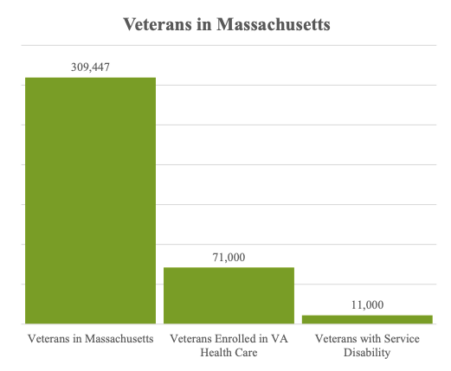
“Addressing drug overdose in the veteran population requires accessible and non-judgmental, low threshold, wraparound, and holistic solutions.”
Before they discussed what they can do to help more veterans access medical products during their meeting last week, Cannabis Control Commission members shared a presentation with some background on VA healthcare and how “veterans in Massachusetts continue to face significant barriers primarily due to the existing federal illegality of cannabis.”
Out of a veteran population with more than 300,000 individuals, 71,000 are enrolled in the VA system, with “just under 11,000 vets in Mass having a 100% service-connected disability rating designating them as permanently and totally disabled.” Furthermore, commissioners noted, “U.S. military veterans have been heavily impacted by the opioid overdose crisis, with drug overdose mortality rates increasing by 53% from 2010–2019.”

Also troubling: “The risks for overdose that veterans face need to be understood as resulting from an ongoing interaction among biological/physiological, psychological, and social/structural factors.” Which has led to thinking, by the CCC and others, that “addressing drug overdose in the veteran population requires accessible and non-judgmental, low threshold, wraparound, and holistic solutions that recognize the complex etiology of overdose risk for veterans.”
“Veterans are more susceptible to opioid addiction as they are more likely to suffer from chronic pain,” CCC members noted in their presentation on the subject. “In addition, many veterans suffer from mental health problems like Post-Traumatic Stress Disorder (PTSD), making them more likely to abuse drugs and alcohol in an attempt to self-medicate.”
In order to address the situation, last week CCC members endorsed “expanding the definition of ‘qualifying patient’ and ‘debilitating medical condition’ to help reduce financial burdens and barriers to medical marijuana access for Massachusetts veterans.”
Whereas “Qualifying patient” is currently defined by state law as “a person who has been diagnosed by a registered healthcare professional as having a debilitating medical condition,” CCC members want to add those who meet the following description: “a veteran receiving their health care at a federal Veterans Administration facility provides their Veterans Administration ‘Blue Button Report Problem List’ indicating an existing debilitating medical condition to the Commission.” Created in 2010, the “Blue Button” is a “web-based feature through which patients may easily download their medical histories and share it with health care providers, caregivers, and others they trust.”
Members also want to expand the definition of qualifying “Debilitating medical conditions,” which are currently cancer, glaucoma, positive status for human immunodeficiency virus, acquired immune deficiency syndrome, hepatitis C, amyotrophic lateral sclerosis, Crohn’s disease, Parkinson’s disease, and multiple sclerosis. By adding “post-traumatic stress disorder, opioid use disorder, and other conditions as determined in writing by a registered qualifying patient’s registered healthcare professional” to the list, commissioners believe the program can better “help reduce financial burdens and barriers to medical marijuana access for Massachusetts veterans.”
“I believe federal prohibition of cannabis has had a chilling effect on our veterans’ ability to seek treatment here in Massachusetts and even to pursue employment in the cannabis industry,” Commissioner Bruce Stebbins said during the meeting. “This is really a question of access and equity for our veterans.”

























